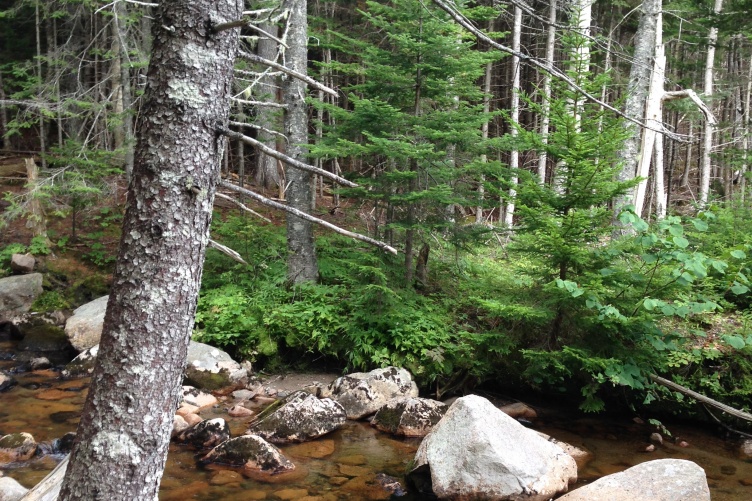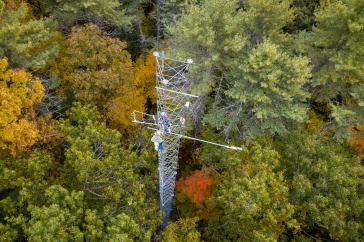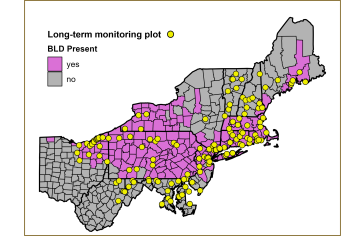
Photo credit: William McDowell
Following a three-year hiatus, the Northeastern States Research Cooperative (NSRC) has been revitalized, thanks to $2 million in funding for the 2020 fiscal year from the U.S. Forest Service. The NSRC, a competitive grant program that promotes high-quality research on forest and community sustainability and funded more than 335 research projects in the Northern Forest in New Hampshire, Vermont, Maine and New York from 2001 to 2016, will be relaunching with a new strategic vision.
As a part of NSRC 2.0, the cooperative will be looking to the Northern Forest end user community for specific research needs that will become the focus of funded projects, rather than soliciting proposals that fit within broad themes like forest productivity and ecosystem health.
“We plan to focus on outcomes that Northern Forest communities and stakeholders – anyone who uses, visits or values the forests — find directly relevant and applicable,” says William McDowell, UNH professor of environmental science and one of the NSRC’s directors. “The new format will include greater input from the stakeholder community, and each year we will offer a single competition that encourages interdisciplinary research to address one of the stakeholders’ key research questions.”
A Distinctive Forest Region
The Northern Forest is a 26-million acre working landscape with unique recreational opportunities, vast forested watersheds and diverse wildlife. It is home to more than 2 million residents and stretches from eastern Maine, through New Hampshire and Vermont and into northern New York. In the 1980s, the forest was designated a priority for national protection by the Federal government in response to growing concerns that remaining forest land and timber were falling victim to unplanned fragmentation, piecemeal development and real estate speculation.
“The Northern Forest is distinctive biologically and socioeconomically. It is home to strongly resource-based communities whose economies rely on extractive industries like logging and paper, hunting, fishing and tourism,” says McDowell. “The cooperative was originally conceived to help address the best way to manage the forest to protect the economies of these communities, while simultaneously addressing forest health, soils, water, biodiversity and wildlife and understanding how each interacts with human economic activity.”
A Vital Funding Source
The NSRC is a vital source of funding for applied forest research and outreach efforts throughout the Northern Forest according to McDowell, who says grants for this type of highly specific work are not often available through national programs, which look for research that’s more broadly applicable.
In the 15 years the cooperative was initially active, it received almost $24 million from the U.S. Forest Service and awarded grants ranging from $3,000 to more than $250,000 for projects that resulted in original data, predictive tools, and clear recommendations to manage, protect, and monitor essential natural resources in a region that depends on heathy, working forests. The funding supported the work of more than 200 undergraduates and graduate students, research technicians and postdoctoral researchers and led to more than 300 peer-reviewed scientific publications and approximately 900 professional presentations.
Among those who benefited from the program is Alexandra Contosta, who was a post-doctoral research associate when she received NSRC funding to support her work on winter climate change in the Northern Forest. The formative experiences she had as a result of the grant are what McDowell describes as “career-changing for a junior scientist.”
Contosta is now a research assistant professor at UNH’s Earth Systems Research Center, and, in fall 2019, her research study examining the last 100 years of weather station data from northern forests across the U.S was published in the journal Ecological Applications.
An Important Four-State Partnership
The NSRC is cooperatively managed by the U.S. Forest Service and four public universities in Maine, New Hampshire, New York and Vermont. Along with McDowell from UNH, William “Breck” Bowden from the University of Vermont Rubenstein School of Environment and Natural Resources, David Newman from the State University of New York College of Environmental Science and Forestry, and Aaron Weiskittel from the University of Maine Center for Research on Sustainable Forests serve as directors.
The NSRC is also working closely with the Hubbard Brook Research Foundation, an NH-based research foundation that specializes in the transfer of knowledge from researchers to the general public. The foundation will play an active role in interpreting and disseminating the research findings to a wide audience. Its director, Anthea Lavallee, is also actively engaged in helping to re-envision NSRC.
“The value [of the NSRC] for New Hampshire is that the grant program allows us to use the outstanding team of environmental researchers and the data they have collected in service of our communities to try to head off undesirable outcomes,” says McDowell. “Funding research in the Northern Forest will help keep the state vibrant and ahead of the curve in terms of understanding what the future might bring.”
Although the NSRC doesn’t yet know how the $2 million will be allocated among the four states, they’ll be aiming to award grants that cover a range of locations and scientific approaches and support researchers at many different career stages. McDowell anticipates that a request for proposals will be issued in early summer 2020.
-
Written By:
Sarah Schaier | College of Life Sciences and Agriculture



















































